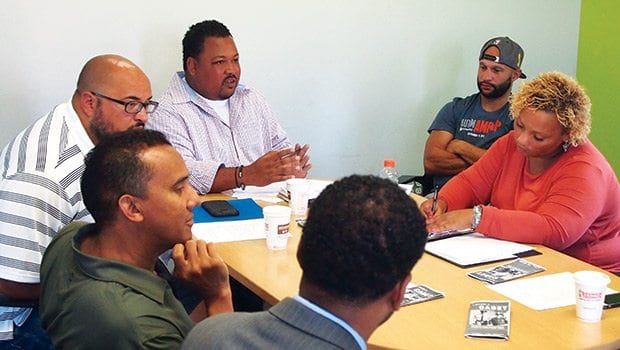
Gang violence was rife in the Cape Verdean community in the 1990s and 2000s. When the police sent in units to pursue it, they encountered basic problems: no officers spoke Cape Verdean Creole and they did not have the community’s trust.
Now with Cape Verdean presence in the forces growing and the Cape Verdean Police Officer Association marking its first year, already change is felt.
The old days
“There was no strong police force to play liaison to the community, especially with gang violence,” said Louis Angels, a Cape Verdean officer in Dorchester and president of the Cape Verdean Police Officer Association. “There were no Cape Verdeans in gang units or specialized units, and those were the main units going after it in the community.”
Angels came to the BPD through the cadet program. At the time, there were only five to seven Cape Verdeans in the force, he said.
Sgt. John Teixeira, the first Cape Verdean-born officer to make sergeant, saw similar problems.
He said that crime really started to appear in the community in the ‘90s, and at the time police trying to talk to community members found that many either had difficulty expressing themselves in English or were reluctant to do so with the officers.
“I used to be called out to quite a few scenes where people didn’t speak English,” Teixeira said. “There was a big language barrier.”
Strange land, strange laws, but familiar faces
Today there are seven Cape Verdeans on the gang unit and 43 on the total force. Their presence and work have contributed to major strides in reaching the community.
“I see people are less afraid to talk to the police now, especially in the Cape Verdean community,” said Teixeira. New arrivals struggle with adjusting to a new language and country as well as learning new laws and policies, he said.
It is easy to see why they would be unsure who to trust.
“It was still a struggle when I first got on, that mistrust,” Teixeira said. “Now things have changed — people who came from Cape Verde, their friends are officers.”
Officers attend community meetings, work with local merchants and have much better communication with parents of children who either are already in crime or at risk of crime involvement, said Angeles. They seek to be ambassadors to the community and serve needs of youths and families.
The Cape Verdean officers reach out to and field questions from parents. A common issue Angels said he encountered was that many newly-arrived parents fear they will get in trouble for disciplining their children. The resulting hands-off approach can be let some kids go astray.
Now officers explain policies to parents including “what measures they can take to prevent their kids joining a gang or getting in trouble,” said Angels.
Officers helping officers
A major force facilitating the officers’ work in the community is the Cape Verdean Police Officer Association.
Angels helped found the association in 2014. His goal was to provide the kind of mentoring and resources he wished were available to him after joining the force fresh out of the cadet program.
“I didn’t have mentors,” he said, “I tried to help the community as I went along but didn’t know who to turn to when a family in the Cape Verdean community had an issue.”
Real difference
The association members’ work takes them beyond crime fighting to a wide range of social needs in the community. Particular emphasis is on voter registration, youth development programs, education for new immigrants and crime awareness.
Historically, Cape Verdeans are not active voters, said Angels: about 30,000 Cape Verdeans are registered to vote in Boston and an equal number are not. This is something he hopes to change.
Another key focus of the association is promoting education and keeping youth out of violence.
“We give them [the youth] blueprints to going about getting education and doing something positive with their lives,” Angels said. A current project is finding a location for a community center where officers can talk with and mentor youth.
“We want kids in the community to see Cape Verdean officers as role models as opposed to just police who are arresting them,” said Teixera.
Teixeira said they make an effort to ensure children stay in the school system. A few years ago, before the CVPOA, officers found that a number of children were skipping school and lying about it to their parents, who often did not speak English and were too busy with multiple jobs to investigate further. Officers informed parents of the situation and urged them to get more involved, such as by attending school meetings.
“I think we made a dent,” said Teixeira.
In addition to its planned goals, the association members aim to assist with any need that arises.
Past events include a grassroots campaign to educate community members on what is involved in the civil service exam, the test required for entering the police force. They also sponsored radio ads and held a community meeting, said Teixeira and Angels.
Angels says people he has interacted with in the past, whether that was giving assistance or to pushing them to straighten out their act, sometimes cross paths with him again and tell him of the positive effect he had on them.
“Making a difference in people’s lives and encountering them later on the line, and them reflecting on how much I helped them. That’s my favorite part [of being on the force]. … My favorite part is to reconnect … and see I helped them.”


![Banner [Virtual] Art Gallery](https://baystatebanner.com/wp-content/uploads/2024/04/Cagen-Luse_Men-at-store-e1713991226112-150x150.jpg)



